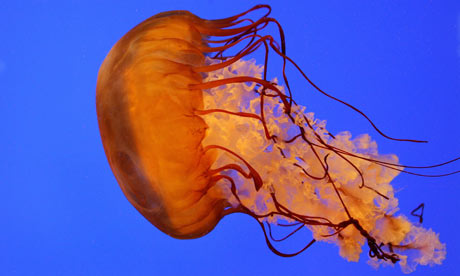
Jellyfish and the Portuguese man-of-war are reportedly heading for Mediterranean beaches. But what should you do if you get stung? Here's our cut-out-and-keep guide: pack it, or tuck it into your trunks.
There are different types of jellyfish - and also things that look like jellyfish but are different entirely (like man-of-wars) - and their stings respond to different treatment. But rather than wade back into the sea to identify the offending creature there are a few general steps you can take. Most stings will cause little more than pain and discomfort but if you are in any doubt, call for medical help.
1 Avoid them. If you see one in the water, get out. If it's on the beach, walk around it - their tentacles can still sting.
2 If you're stung, get out of the water and don't thrash around. A Portuguese man-of-war may wrap its tentacles around you if you start flailing.
3 If you see tentacles on you, pick them off with a towel or the corner of a credit card. Don't rub the area. This will make the sting worse. But if you use a towel, be careful. The stinging cells - called nematocysts - might stick to it.
4 Vinegar, applied liberally, can stop the remaining nematocysts on the skin from discharging. This is particularly important if you are in tropical water, because of the types of jellyfish found there.
5 If vinegar is not available, rinse the area in salt water.
6 Contrary, to popular opinion and American sitcoms (Friends), cleaning with urine or fresh water and rubbing with sand are best avoided.
7 Put a bag of ice wrapped in a cloth on the affected area to relieve pain.
8 If you have is any difficulty breathing, dizziness, or an allergic reaction, call for medical help immediately.
• Deborah Cohen is editor of the British Medical Journal

